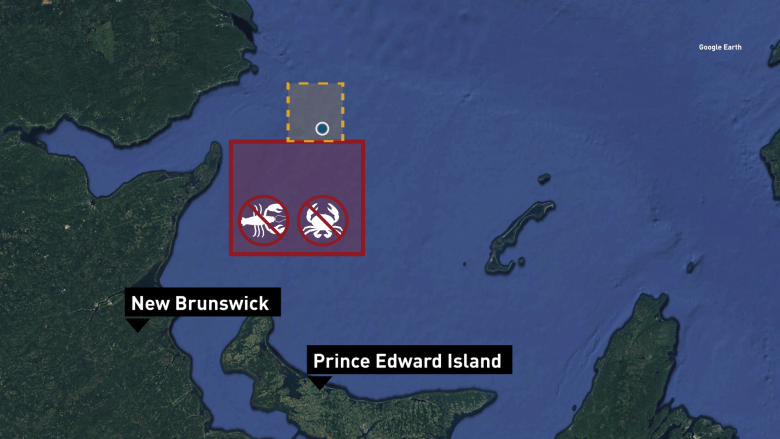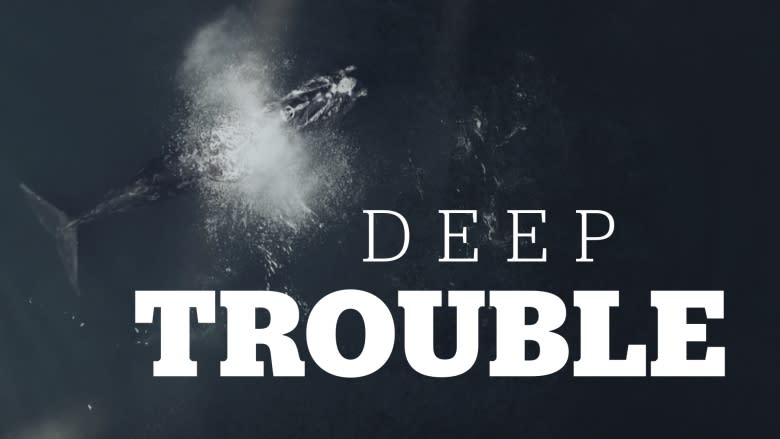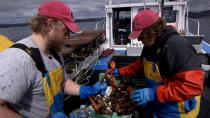'That area is not well-known': Scientist says restrictions in Gulf could ease over time
A man who has devoted more than three decades to studying the endangered North Atlantic right whale said he understands the frustrations of New Brunswick fishermen, but believes fishing restrictions in the Gulf of St. Lawrence could ease once government understands more about the whales' behaviour.
The Department of Fisheries and Oceans announced the temporary closure of a 3,000-square kilometre area to fishing, after a pair of right whales were seen swimming in the waters east of Miscou on Saturday.
Crews had until Wednesday afternoon to remove their gear from the water, causing anger and panic among crab and lobster fishermen, who were already frustrated by meagre catches this season.
Dr. Charles 'Stormy' Mayo, one of the founders of the Centre for Coastal Studies, has been doing right whale surveillance work in Cape Cod Bay for years to help Massachusetts manage its fisheries.
For the past 10 years, the state has been implementing automatic closures for fixed gear fisheries in the bay between February and April, as more than half the species' population — 252 whales this year — congregate there during those months.
As soon as a surveillance flight finds the whales are gone, the closure is lifted.
Stricter in Canada
Mayo recognizes the protection measures have been stricter in Canada, and said that is likely because Ottawa doesn't have a lot of data yet to go on. Seeing whales in the gulf is a very new phenomenon.
"That area is not well known, and the duration of the whales' presence there is not well understood," said Mayo.
"Here it is pretty much like clockwork."
As a result of the new measures put in place this year, a fishing area needs to be free of whales for at least 15 days for a closure to be lifted, and the sighting of a single whale can result in a closure.
That's in contrast to fisheries management in Cape Cod, where right whales have been coming since the mid-80s, and scientists have a great understanding of their patterns.
'Troubling for the fishermen'
"When that kind of process that the whales are responding to is understood, my guess would be that the strictness can change in Canadian waters," said Mayo.
In the absence of data, he said scientists in Canada are trying to make educated guesses as to whether whales have truly left a fishing area at any given point.
"Yes, it is troubling for the fishermen who are trying to make a living," said Mayo.
"Yet it is a measure I believe ultimately is in the benefit of the fishermen, because neither the fishermen nor the whales can afford more mortalities. If there are more mortalities, that will probably institute more strict regulations."
'Not just an issue of ship strikes and entanglement'
Mayo believes there are only about 430 Atlantic right whales left in the world.
Equally alarming as last year's historical death toll, is the fact no new calves were born this year, he said.
There are normally 20 to 30 right whale births each year, although that number has been declining rapidly since 2010.
"That's a critical part of the equation. It's not just an issue of ship strikes and entanglement. Obviously if the population is not reproducing, the future is very grim," he said.
Mayo said the causes of dropping birth rates are not yet well understood, but could be due to changes in the whales' ecosystems, like a decrease or pollution in their food source, illness in the population or genetic stresses.
There is also the 'unknown, but likely substantial' impact of noise, like that caused by ships or oil drilling operations.
"These are acoustic animals and perhaps, lacking a calm ocean, they are simply not able to find one another," said Mayo.
"It's a very troubling part of the story … Most of us are truly worried right now."
The latest fisheries closure in the Gulf will be in effect for 15 days, at least until June 7, and fishing areas will only reopen after two surveillance flights have shown the whales left the area.
Fisheries and Oceans said there have been no new sightings since the two whales were seen on the weekend.
It is not clear where those whales are at the moment, but scientists have surveyed the area aerially regularly since Saturday.
At least 18 North Atlantic right whales have been found dead in the last year — 12 in Canadian waters and six in U.S. waters.
Necropsies on two of the whales found evidence of entanglement in fishing gear.
CBC New Brunswick produced Deep Trouble, an original podcast series on the deadly summer of 2017 for the North Atlantic right whale.
Listen to all six episodes from the CBC Podcast page or subscribe to the podcast in iTunes.










